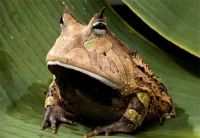|
 By submitting your articles or
original content to other domains, it gives you the opportunity to link back to your own
website and increase its page
rank. A higher page rank and carefully worded backlinks will help place your page(s)
higher up in google's and other search engines' rankings in the keywords of your choice. By submitting your articles or
original content to other domains, it gives you the opportunity to link back to your own
website and increase its page
rank. A higher page rank and carefully worded backlinks will help place your page(s)
higher up in google's and other search engines' rankings in the keywords of your choice.
For example, let's say you made a webpage about frogs and wanted to reach a broader
audience with it. As explained through the search engine optimization link above, there
are many ways to get your page(s) to the top of the search engines. You could have the
nicest frog pages in the world, but if they are not found by anyone on the net, who could
appreciate them? Getting them to the top of google and other search engines in relevant
keywords is one way to reach your audience. And one of the ways which helps get your pages
to the top of the search engines is to submit articles to other domains.
By submitting articles to other domains, you are creating new webpages on the net which
point back to your main pages. 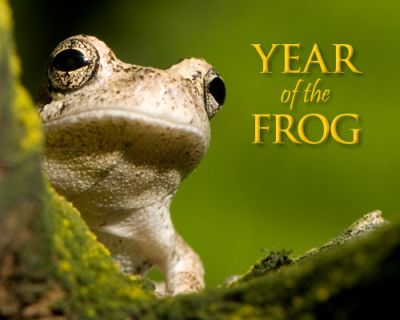 This is more powerful than a
simple link exchange, or submitting your links to many directories. The search engines
give greater importance to backlinks (explained through the "page rank" link
above) which are embedded within the text of a webpage than simple links at the
bottom or side of a page. The search engines also value original content. It is not very
beneficial to submit the exact same content to many different domains, although it may be
somewhat beneficial. Generally we try to avoid hosting content that can be found elsewhere
on the internet, because it has potentially negative consequences. But you can write the
same content using different wording, even though there are a limited number of changes to
the content. We use software and special services to analyse content submitted to our
article submission site in order to determine if the content is duplicated somewhere else
on the net. We can tell exactly to what degree the content has been duplicated, see the
exact differences, and which pages host the same wording. If it is too similar to other
pages on the net, we may remove the submission. The search engines use similar software
and their process is entirely automated, incorporated into their search algorithms. They
can even tell, as we can, which page of the duplicate content was actually put on the web
first, meaning the original page, or the "original content". There are many
websites and services which offer to submit your content to thousands of sites and
domains, and it may seem attractive, but the search engines are no dummies and they have
their own army of well-paid personnel whose job it is to understand these various gimmicks
so that they can tweak their search algorithms and compensate against them. This is more powerful than a
simple link exchange, or submitting your links to many directories. The search engines
give greater importance to backlinks (explained through the "page rank" link
above) which are embedded within the text of a webpage than simple links at the
bottom or side of a page. The search engines also value original content. It is not very
beneficial to submit the exact same content to many different domains, although it may be
somewhat beneficial. Generally we try to avoid hosting content that can be found elsewhere
on the internet, because it has potentially negative consequences. But you can write the
same content using different wording, even though there are a limited number of changes to
the content. We use software and special services to analyse content submitted to our
article submission site in order to determine if the content is duplicated somewhere else
on the net. We can tell exactly to what degree the content has been duplicated, see the
exact differences, and which pages host the same wording. If it is too similar to other
pages on the net, we may remove the submission. The search engines use similar software
and their process is entirely automated, incorporated into their search algorithms. They
can even tell, as we can, which page of the duplicate content was actually put on the web
first, meaning the original page, or the "original content". There are many
websites and services which offer to submit your content to thousands of sites and
domains, and it may seem attractive, but the search engines are no dummies and they have
their own army of well-paid personnel whose job it is to understand these various gimmicks
so that they can tweak their search algorithms and compensate against them.
I will explain below why
it is beneficial to submit your articles to other domains, but first I would like to
explain why it is important that your submitted article is "original" and not an
exact duplicate. To make your content "original", you can modify your text in
places, or quickly rewrite your content from scratch. Rewriting from scratch is the best,
but more time consuming. We try to avoid exact duplications because it can put a black
mark on our entire domain. Disk space is becoming increasingly cheaper. Heck, our webhost
service charges only 5 dollars a month for an unbelievable 300 gigabytes of space. That
can absorb a heck of a lot of text. Search engines cannot evaluate pictures, so we could
technically duplicate much of Wikipedia and host the same content on our own domain.  This is a very simple procedure,
and if it were successful, many people would be doing it. But it doesn't work, and in fact
such "black hat" tactics are usually detrimental to the entire domain. This is a very simple procedure,
and if it were successful, many people would be doing it. But it doesn't work, and in fact
such "black hat" tactics are usually detrimental to the entire domain.
By being careful against such common "black hat" (nasty and dishonest) tactics,
we are ensuring the integrity and respect of our domain as seen by the search engines,
such that any content or articles that you submit to our site will be more respected and
the backlinks pointing to your own pages will have greater value and positive impact.
A backlink is basically a "hyper"/web link which links "back" to your
page(s) from outside of your own domain. For example, you could write an article and
submit it to Wikipedia, and from that article, or through the "third party
links" section at the bottom of that page, you could link back to your own page.
However, the problem with Wikipedia is that they "nofollow" all their outlinks.
An outlink is a hyper/weblink which links out from a page in one domain to a page in
another domain. Links which connect to pages within the same domain might be considered as
"interlinks".
The point of linking from pages within one domain to another is to increase page rank, as
explained above, as part of the complex and convoluted process of getting one's pages to
the top of the search engines.
Wiki knows all this, and because its pages are so popular, it has implemented a standard
practice of assigning all "outlinks" from its pages as "nofollow". A
nofollow outlink is a special outlink which instructs the search engines not to follow it
"out" of their domain, and hence not give any credit whatsoever to the external
pages they are linking to. In horrid tech speak, a nofollow link looks like: <a href="http://somedomain.com/somewebsite.html"
rel="nofollow">keyword text outlinking from</a>.
To check the third party
outlinks on wiki, you can right click with your mouse on any one of its webpages, choose
"View source", and find the outlinks on the page. If they are not interlinking
to any of wiki's own pages, they will certainly be given the rel="nofollow"
characteristic.

Wouldn't it be nice if froggies could eat all our
spammers?
|
There is
also software available which will mark all such nofollow outlinks on any webpage in a
certain colour - for easy viewing.
Anyway, the reason why wiki does this is because it knows that every spammer in the world
would totally accost all their pages and submit valuable outlinks to their own pages. If
that were the case, wiki would never find enough volunteers who could moderate against
such easy spamming tactics. Especially since the spammers would invent some software which
would automate the linking and submission process. The spammers attack everywhere they
can, such as the comments boxes on regular blog sites. They are a horrible bug indeed.
The bottom line is that you would not benefit to place your article on Wikipedia, no
matter how popular, famous and high traffic the website may be, simply because any outlink
to your page would be hampered by a nofollow characteristic (your page rank and rankings
would not improve in ANY way).
Your articles submitted to our site are not hampered in this way, but we would probably
limit the number of outlinks you can place on any particular page. Again, the search
engines do not like spam, and if all the pages within our domain linked out from every
single word found on every single page… well, long story, but essentially it is a
diluting process, and it weakens the entire domain.
We know all these tricks, and good and bad practices, which means that you can be
confident any content you submit to our site will be respected by the search engines, and
increase the value of the backlinks to you.
Why Backlinks and Article Submission is Good
As explained in detail through the Page
Rank link above, backlinks (from pages within domains other than your own) help push up
your page's rankings among the search engines.  "Ranking" is its
numerical placement or order in certain keyword searches. In our frogs example above,
let's say a search on google for the keyword "frog" yields 20 million results
(meaning there are 20 million webpages mentioning the word frog and which google deems
worthy enough to place in its results - there are many more, but they adopt blackhat and
other nasty tricks and have been dropped entirely from google's results). If your page is
ranked in position one thousand out of 20 million (an impressive accomplishment if you
consider the sheer magnitude of the number 20 million), do you think anyone will stumble
on your page if ranked in position one thousand? How about one hundred? Or even 20? How
often do you yourself go past the first page of the top ten results when surfing the
internet? "Ranking" is its
numerical placement or order in certain keyword searches. In our frogs example above,
let's say a search on google for the keyword "frog" yields 20 million results
(meaning there are 20 million webpages mentioning the word frog and which google deems
worthy enough to place in its results - there are many more, but they adopt blackhat and
other nasty tricks and have been dropped entirely from google's results). If your page is
ranked in position one thousand out of 20 million (an impressive accomplishment if you
consider the sheer magnitude of the number 20 million), do you think anyone will stumble
on your page if ranked in position one thousand? How about one hundred? Or even 20? How
often do you yourself go past the first page of the top ten results when surfing the
internet?
In any case, the point of this entire exercise is to try and get one's page to the TOP
FIRST position, or at least the higher the better. Linking back to your page from original
content placed on other domains is one honest method how to help you accomplish this.
Suggestions How to Backlink from any Article you
Submit
So let's say you're convinced and you'd
like to submit an article to our site. What next? Well, let's break this down into its
various parts.
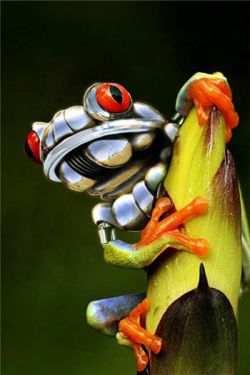 First of all, the keywords of the
page is important. If you want your own page to be pushed up in rankings among the search
engines, you want it to look like other pages around the net of SIMILAR content are
linking to your own page. It is like a vote from each of those pages, saying, "Hey,
I'm talking about frogs, and while I'm doing so I'm linking to this really great website
about frogs (your link)." If there are
many unique and original content pages on the web which talk about frogs and link to your
fantastic page about frogs, you can bet yer booties the search engines will think it must
be good and therefore award your page a higher ranking. First of all, the keywords of the
page is important. If you want your own page to be pushed up in rankings among the search
engines, you want it to look like other pages around the net of SIMILAR content are
linking to your own page. It is like a vote from each of those pages, saying, "Hey,
I'm talking about frogs, and while I'm doing so I'm linking to this really great website
about frogs (your link)." If there are
many unique and original content pages on the web which talk about frogs and link to your
fantastic page about frogs, you can bet yer booties the search engines will think it must
be good and therefore award your page a higher ranking.
But keywords are important. Obviously, a page which talks primarily about cosmetics but in
one instance mentions a special frog skin extract which helps complexion, such a
backlink will not have as strong and positive affect on the rankings of your frog page as
would a backlink from a page which talks primarily about frogs. There is a positive
affect, but not as strong.
Therefore, when formulating the content of your submitted article, try to focus on the theme
and on the keywords. On the other hand, mentioning the keyword too many times and
artificially is referred to as "keyword stuffing". Yes, the search engines
employ mathematical geniuses who are all aware of these little tricks. Stuff a little, but
don't overdo it. We moderate all our pages, because it is important that our domain is not
negatively affected, and any pages submitted with these common blackhat and nasty tricks
will simply be removed.
Now that you are sticking to your theme (although you could write about other subjects -
the positive affect for your rankings just wont be as beneficial), and you are focusing on
stuffing your keywords mildly, but not too much, you can now start to think about from where
to link out to your own pages. From where? Well, obviously from the word "frog",
you silly bunny! But even so it is not as simple as that. If you submit a hundred
fantastic, captivating and original content pages in a hundred honest domains such as
ours, and from each of these fantastic articles you always link out from only the word
"frog", even this will spark off some alarm signals among the search engines.
Amazing, isn't it? The best approach to take is to try and be as honest as possible, and
use only the mildest, surreptitious and gentle spamming techniques you can.  Do not think you can fool the
search engines with your simple yet overemphasized tricks? They've been thought up a long
time ago, and a long time ago the search engines have caught on and incorporated
appropriate countermeasures. After all, if the search engines were to let their results be
influenced by such simple tricks, we'd be back in the early days of the internet when the
top nine results of every keyword search yielded websites promoting porno. And no one
would use such useless search engines anymore. Google now makes 26 billion dollars a year
from advertising revenues, because so many people use its search engine. With so much
money, you can bet they are going to spend some of it to hire an army of geniuses and
combat any deceptive tactics the lesser humans can think up. And if you happen to be a
super genius yourself and think of something they have not, others will eventually catch
on, so will the search engines, and eventually you may find all your hard and dishonest
work penalized, neutralized and negated. Do not think you can fool the
search engines with your simple yet overemphasized tricks? They've been thought up a long
time ago, and a long time ago the search engines have caught on and incorporated
appropriate countermeasures. After all, if the search engines were to let their results be
influenced by such simple tricks, we'd be back in the early days of the internet when the
top nine results of every keyword search yielded websites promoting porno. And no one
would use such useless search engines anymore. Google now makes 26 billion dollars a year
from advertising revenues, because so many people use its search engine. With so much
money, you can bet they are going to spend some of it to hire an army of geniuses and
combat any deceptive tactics the lesser humans can think up. And if you happen to be a
super genius yourself and think of something they have not, others will eventually catch
on, so will the search engines, and eventually you may find all your hard and dishonest
work penalized, neutralized and negated.
Therefore, when linking back to your fantastic page from within the text of your fantastic
and original articles submitted to quality domains, make sure to linkback from frog
related keywords, but not always the exact same words. Sometimes you might link back from
"green frog", other times from "frogs", and other times from "big
fat and angry frogs".
But hey, let's involve a bit of juicy strategy, shall we? First of all, let's say you own
the domain frogs.com. If you write a juicy article and submit it to a nice and honest
domain like ours, linking three or more times from within that article to frog.com will
not be a great strategy. Instead, make sure to write a super interesting article about
'big fat and angry frogs', and put it on a webpage in your domain
frogs.com/big-fat-and-angry-frogs.html. Make another webpage frogs.com/green-frogs.html.
Make sure to use the hyphen, because the search engines like that. Now, from within your
fancy article submitted on our domain, make a casual mention about big
fat, angry and hairy frogs and link out from that text. On another page you
submit to another domain, you might link out from really big fat
and angry frogs. Get the point? Mix it up a bit, but keep it fairly consistent.
And keep your themes matched, if possible.
Anyway, happy submitting!
|

 By submitting your articles or
original content to other domains, it gives you the opportunity to link back to your own
website and increase its
By submitting your articles or
original content to other domains, it gives you the opportunity to link back to your own
website and increase its  This is more powerful than a
simple link exchange, or submitting your links to many directories. The search engines
give greater importance to backlinks (explained through the "page rank" link
above) which are embedded within the text of a webpage than simple links at the
bottom or side of a page. The search engines also value original content. It is not very
beneficial to submit the exact same content to many different domains, although it may be
somewhat beneficial. Generally we try to avoid hosting content that can be found elsewhere
on the internet, because it has potentially negative consequences. But you can write the
same content using different wording, even though there are a limited number of changes to
the content. We use software and special services to analyse content submitted to our
article submission site in order to determine if the content is duplicated somewhere else
on the net. We can tell exactly to what degree the content has been duplicated, see the
exact differences, and which pages host the same wording. If it is too similar to other
pages on the net, we may remove the submission. The search engines use similar software
and their process is entirely automated, incorporated into their search algorithms. They
can even tell, as we can, which page of the duplicate content was actually put on the web
first, meaning the original page, or the "original content". There are many
websites and services which offer to submit your content to thousands of sites and
domains, and it may seem attractive, but the search engines are no dummies and they have
their own army of well-paid personnel whose job it is to understand these various gimmicks
so that they can tweak their search algorithms and compensate against them.
This is more powerful than a
simple link exchange, or submitting your links to many directories. The search engines
give greater importance to backlinks (explained through the "page rank" link
above) which are embedded within the text of a webpage than simple links at the
bottom or side of a page. The search engines also value original content. It is not very
beneficial to submit the exact same content to many different domains, although it may be
somewhat beneficial. Generally we try to avoid hosting content that can be found elsewhere
on the internet, because it has potentially negative consequences. But you can write the
same content using different wording, even though there are a limited number of changes to
the content. We use software and special services to analyse content submitted to our
article submission site in order to determine if the content is duplicated somewhere else
on the net. We can tell exactly to what degree the content has been duplicated, see the
exact differences, and which pages host the same wording. If it is too similar to other
pages on the net, we may remove the submission. The search engines use similar software
and their process is entirely automated, incorporated into their search algorithms. They
can even tell, as we can, which page of the duplicate content was actually put on the web
first, meaning the original page, or the "original content". There are many
websites and services which offer to submit your content to thousands of sites and
domains, and it may seem attractive, but the search engines are no dummies and they have
their own army of well-paid personnel whose job it is to understand these various gimmicks
so that they can tweak their search algorithms and compensate against them.
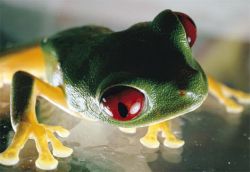
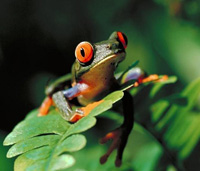
 This is a very simple procedure,
and if it were successful, many people would be doing it. But it doesn't work, and in fact
such "black hat" tactics are usually detrimental to the entire domain.
This is a very simple procedure,
and if it were successful, many people would be doing it. But it doesn't work, and in fact
such "black hat" tactics are usually detrimental to the entire domain. 
 "Ranking" is its
numerical placement or order in certain keyword searches. In our frogs example above,
let's say a search on google for the keyword "frog" yields 20 million results
(meaning there are 20 million webpages mentioning the word frog and which google deems
worthy enough to place in its results - there are many more, but they adopt blackhat and
other nasty tricks and have been dropped entirely from google's results). If your page is
ranked in position one thousand out of 20 million (an impressive accomplishment if you
consider the sheer magnitude of the number 20 million), do you think anyone will stumble
on your page if ranked in position one thousand? How about one hundred? Or even 20? How
often do you yourself go past the first page of the top ten results when surfing the
internet?
"Ranking" is its
numerical placement or order in certain keyword searches. In our frogs example above,
let's say a search on google for the keyword "frog" yields 20 million results
(meaning there are 20 million webpages mentioning the word frog and which google deems
worthy enough to place in its results - there are many more, but they adopt blackhat and
other nasty tricks and have been dropped entirely from google's results). If your page is
ranked in position one thousand out of 20 million (an impressive accomplishment if you
consider the sheer magnitude of the number 20 million), do you think anyone will stumble
on your page if ranked in position one thousand? How about one hundred? Or even 20? How
often do you yourself go past the first page of the top ten results when surfing the
internet? First of all, the keywords of the
page is important. If you want your own page to be pushed up in rankings among the search
engines, you want it to look like other pages around the net of SIMILAR content are
linking to your own page. It is like a vote from each of those pages, saying, "Hey,
I'm talking about frogs, and while I'm doing so I'm linking to this really great website
about frogs (your link)." If there are
many unique and original content pages on the web which talk about frogs and link to your
fantastic page about frogs, you can bet yer booties the search engines will think it must
be good and therefore award your page a higher ranking.
First of all, the keywords of the
page is important. If you want your own page to be pushed up in rankings among the search
engines, you want it to look like other pages around the net of SIMILAR content are
linking to your own page. It is like a vote from each of those pages, saying, "Hey,
I'm talking about frogs, and while I'm doing so I'm linking to this really great website
about frogs (your link)." If there are
many unique and original content pages on the web which talk about frogs and link to your
fantastic page about frogs, you can bet yer booties the search engines will think it must
be good and therefore award your page a higher ranking.  Do not think you can fool the
search engines with your simple yet overemphasized tricks? They've been thought up a long
time ago, and a long time ago the search engines have caught on and incorporated
appropriate countermeasures. After all, if the search engines were to let their results be
influenced by such simple tricks, we'd be back in the early days of the internet when the
top nine results of every keyword search yielded websites promoting porno. And no one
would use such useless search engines anymore. Google now makes 26 billion dollars a year
from advertising revenues, because so many people use its search engine. With so much
money, you can bet they are going to spend some of it to hire an army of geniuses and
combat any deceptive tactics the lesser humans can think up. And if you happen to be a
super genius yourself and think of something they have not, others will eventually catch
on, so will the search engines, and eventually you may find all your hard and dishonest
work penalized, neutralized and negated.
Do not think you can fool the
search engines with your simple yet overemphasized tricks? They've been thought up a long
time ago, and a long time ago the search engines have caught on and incorporated
appropriate countermeasures. After all, if the search engines were to let their results be
influenced by such simple tricks, we'd be back in the early days of the internet when the
top nine results of every keyword search yielded websites promoting porno. And no one
would use such useless search engines anymore. Google now makes 26 billion dollars a year
from advertising revenues, because so many people use its search engine. With so much
money, you can bet they are going to spend some of it to hire an army of geniuses and
combat any deceptive tactics the lesser humans can think up. And if you happen to be a
super genius yourself and think of something they have not, others will eventually catch
on, so will the search engines, and eventually you may find all your hard and dishonest
work penalized, neutralized and negated. 

